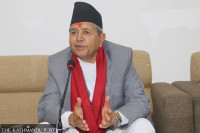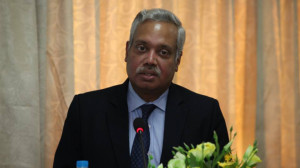National
House panel endorses bill on Education Act amendment
Amid differences among the lawmakers, the Parliamentary Committee on Women, Children and Social Welfare on Wednesday endorsed the bill on eighth amendment to Education Act-1972 moving a step ahead in restructuring the school level education.
Binod Ghimire
Amid differences among the lawmakers, the Parliamentary Committee on Women, Children and Social Welfare on Wednesday endorsed the bill on eighth amendment to Education Act-1972 moving a step ahead in restructuring the school level education.
After three months of discussion, the committee endorsed the bill with a note of dissent from four lawmakers from the ruling CPN-UML—Rajendra Pandey, Dr Bansidhar Mishra, Sri Maya Thakali and Sindhu Jalesha—demanding a provision to operate schools as cooperative. The earlier draft bill had a provision of registering private schools as cooperative. However, under pressure from the private schools operators the provision was scrapped in the last hour. The lawmakers who represent the private sectors were lobbying to scrap the provision, arguing it was against the principle of free market economy. Around 50 cross-party lawmakers in Parliament have been directly involved in the private education sector.
According to the new bill, the schools now will be registered under private and public guthi. “Despite some reservation we have been able to approve the bill. Now we are expecting it to get endorsed by Parliament,” said Ranju Jha, chairperson of the committee. The bill will be discussed in the budget session of Parliament.
The eight amendment process in the Act, which was started some six years ago to set the legal background for the implementation of School Sector Reform Programme (SSRP), has not been materialised yet. The new Act envisions phasing out Higher Secondary Education Board, incorporating Plus Two level in School level education and ending decades-long problem of temporary teachers.
Ranju Jha, chairperson of the committee, said the final draft bill will be put before the panel for endorsement on Wednesday. If there is no consensus, the draft will be put to a vote. “We are committed to table the bill in the full House in the upcoming session that starts on Thursday,” Jha said. As conceptualised by the SSRP, the amendment aims at restructuring the school level education at basic (grades one to eight) and secondary levels (grades nine to 12) from the existing primary (grades one to five), lower-secondary (grades six to eight), secondary (grades nine to 10) and higher secondary (grades 11 to 12) levels. Similarly, the Higher Secondary Education Board will be replaced by the Central Examination Board, and SLC exams will go regional while central assessment will be held only in grade 8.
The Bill also has a provision whereby temporary teachers recruited before February 2011 can either compete for 40 percent reserved posts in total vacancies or choose a golden handshake deal which offers severence sum between Rs 100,000 to Rs 400,000 based on their service period. The deal will be provided under three categories: those with service period of 5-10 years, 10 to 15 years and 15 years and above. Temporary teachers who fall under the first category will be entitled to an amount equal to 15 days’ salary for each service year, while those coming under the second and third categories will be paid one month’s salary and 45 days’ salary respectively for each year of service period. Although the MoE had decided to end the temporary posting of teachers by 2014, terms of temporary teachers was extended to 2018 due to delay in the amendment of the Act.




 14.12°C Kathmandu
14.12°C Kathmandu















